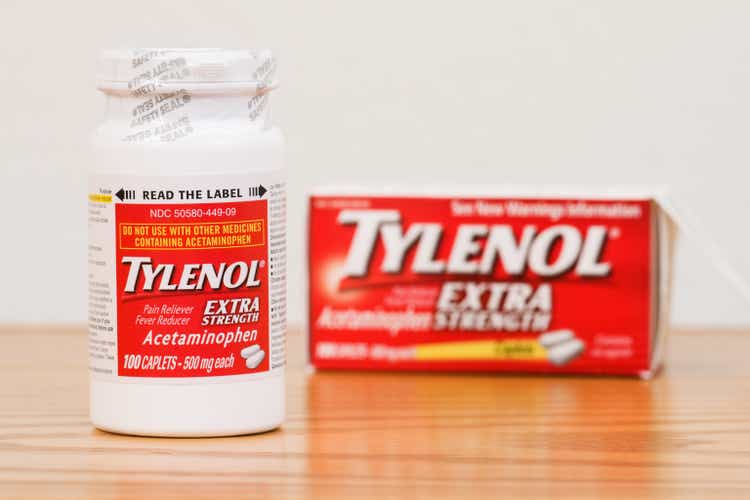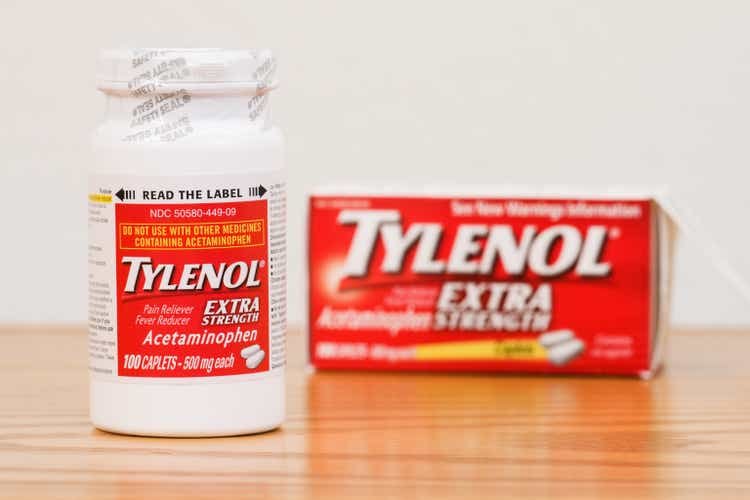
skhoward
Updated at 9:05 p.m.: Adds Kenvue’s comment.
Kenvue (NYSE:KVUE) increased by 5% after-hours after a court ruled in favor of a class-action lawsuit alleging that prenatal exposure to Tylenol could contribute to autism or attention deficit hyperactivity disorder.
Kevnue’s motion for exclude plaintiffs’ general causation experts’ opinions regarding autism spectrum disorder, attention deficit hyperactivity disorder and biological plausibility are granted, U.S. District Judge Denis L. Cote ruled Monday.
“With these rulings, plaintiffs do not have admissible evidence demonstrating that prenatal exposure to acetaminophen causes either ASD or ADHD in offspring,” Judge Cote wrote. “The Court rejects as moot Plaintiffs’ motions to exclude Defendants’ expert testimony.”
Kenvue (KVUE) plans to seek dismissal of the lawsuits, according to an emailed statement to Seeking Alpha.
“There is a risk of unfortunate, real, long-term public health consequences from allowing scientific conjecture in courtrooms to inform medical decision-making,” Kenvue said in the release. “Healthcare professionals – not lawyers – are in the best position to advise their patients on the appropriateness of taking acetaminophen based on their particular health condition. »
Kenvue shares jumped 7% on December 7 after a hearing to determine whether plaintiffs had sufficient expert testimony prove their claims and determine admissibility of evidence.
“Many experts have noted that the science behind these claims is weak and today’s testimony echoes those thoughts,” Canaccord analyst Susan Anderson, who has a rating, wrote in a note at the time. of buy and a price target of $27 for the stock.
Anderson wrote that Kenvue (KVUE) the suit could move toward $23 to $25 per share if the plaintiff’s expert witnesses on general causation are rejected.
“The court’s decision aligns with the position of the U.S. Food and Drug Administration (FDA) and leading medical organizations that have evaluated this issue extensively – the science does not support causation. “We plan to dismiss these lawsuits because there is a risk. for the unfortunate, real, long-term public health consequences of allowing scientific conjecture in courtrooms to inform medical decision-making. Health care professionals – not lawyers – are in the best position to advise their patients on the appropriateness of taking acetaminophen based on their specific medical conditions. .”
The parties are expected to meet and consult on next steps in the litigation and file a joint status letter by Jan. 12, according to a court filing Monday.
Kenvue (KVUE) shares had fallen 12% through Dec. 6, the day before the Daubert hearing, since the company was spun off from JNJ in early May, at least in part due to investor concerns about liability overhang potential in the event of a dispute with Tylenol.
Canaccord’s Anderson wrote that she had already thought about the worst-case scenario for Kenvue (KVUE) would represent a settlement in the range of $6 billion to $8 billion, with KVUE taking $3 billion to $4 billion and retailers taking the rest.
JPMorgan estimated in October that the market was pricing in potential liability related to the acetaminophen litigation. of the order of approximately 10 billion dollars.
Other defendants in this case include CVS Health (CVS), Walmart (WMT) and Walgreens Boots (WBA).


